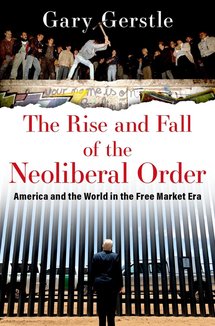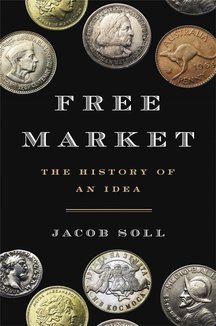Recommended Books

The Rise and Fall of the Neoliberal Order: America and the World in the Free Market Era
Author:
Gary Gerstle
ISBN 13:
978-0197519646
The most sweeping account of how neoliberalism came to dominate American politics for nearly a half century before crashing against the forces of Trumpism on the right and a new progressivism on the left. The epochal shift toward neoliberalism--a web of related policies that, broadly speaking, reduced the footprint of government in society and reassigned economic power to private market forces--that began in the United States and Great Britain in the late 1970s fundamentally changed the world. Today, the word "neoliberal" is often used to condemn a broad swath of policies, from prizing free market principles over people to advancing privatization programs in developing nations around the world. To be sure, neoliberalism has contributed to a number of alarming trends, not least of which has been a massive growth in income inequality. Yet as the eminent historian Gary Gerstle argues in The Rise and Fall of the Neoliberal Order , these indictments fail to reckon with the full contours of what neoliberalism was and why its worldview had such persuasive hold on both the right and the left for three decades. As he shows, the neoliberal order that emerged in America in the 1970s fused ideas of deregulation with personal freedoms, open borders with cosmopolitanism, and globalization with the promise of increased prosperity for all. Along with tracing how this worldview emerged in America and grew to dominate the world, Gerstle explores the previously unrecognized extent to which its triumph was facilitated by the collapse of the Soviet Union and its communist allies. He is also the first to chart the story of the neoliberal order's fall, originating in the failed reconstruction of Iraq and Great Recession of the Bush years and culminating in the rise of Trump and a reinvigorated Bernie Sanders-led American left in the 2010s. An indispensable and sweeping re-interpretation of the last fifty years, this book illuminates how the ideology of neoliberalism became so infused in the daily life of an era, while probing what remains of that ideology and its political programs as America enters an uncertain future.
Find on:
 Amazon
Amazon

Free Market: The History of an Idea
Author:
Jacob Soll
ISBN 13:
978-0465049707
From a MacArthur “Genius,” an intellectual history of the free market, from ancient Rome to the twenty-first century After two government bailouts of the US economy in less than twenty years, free market ideology is due for serious reappraisal. In Free Market, Jacob Soll details how we got to this current crisis, and how we can find our way out by looking to earlier iterations of free market thought. Contrary to popular narratives, early market theorists believed that states had an important role in building and maintaining free markets. But in the eighteenth century, thinkers insisted on free markets without state intervention, leading to a tradition of ideological brittleness. That tradition only calcified in the centuries that followed. Tracing the intellectual evolution of the free market from Cicero to Milton Friedman, Soll argues that we need to go back to the origins of free market ideology in order to truly understand it—and to develop new economic concepts to face today’s challenges.
Adam Smith’s America: How a Scottish Philosopher Became an Icon of American Capitalism
Author:
Glory M. Liu
ISBN 13:
978-0691203812
The unlikely story of how Americans canonized Adam Smith as the patron saint of free markets Originally published in 1776, Adam Smith’s The Wealth of Nations was lauded by America’s founders as a landmark work of Enlightenment thinking about national wealth, statecraft, and moral virtue. Today, Smith is one of the most influential icons of economic thought in America. Glory Liu traces how generations of Americans have read, reinterpreted, and weaponized Smith’s ideas, revealing how his popular image as a champion of American-style capitalism and free markets is a historical invention. Drawing on a trove of illuminating archival materials, Liu tells the story of how an unassuming Scottish philosopher captured the American imagination and played a leading role in shaping American economic and political ideas. She shows how Smith became known as the father of political economy in the nineteenth century and was firmly associated with free trade, and how, in the aftermath of the Great Depression, the Chicago School of Economics transformed him into the preeminent theorist of self-interest and the miracle of free markets. Liu explores how a new generation of political theorists and public intellectuals has sought to recover Smith’s original intentions and restore his reputation as a moral philosopher. Charting the enduring fascination that this humble philosopher from Scotland has held for American readers over more than two centuries, Adam Smith’s America shows how Smith continues to be a vehicle for articulating perennial moral and political anxieties about modern capitalism.